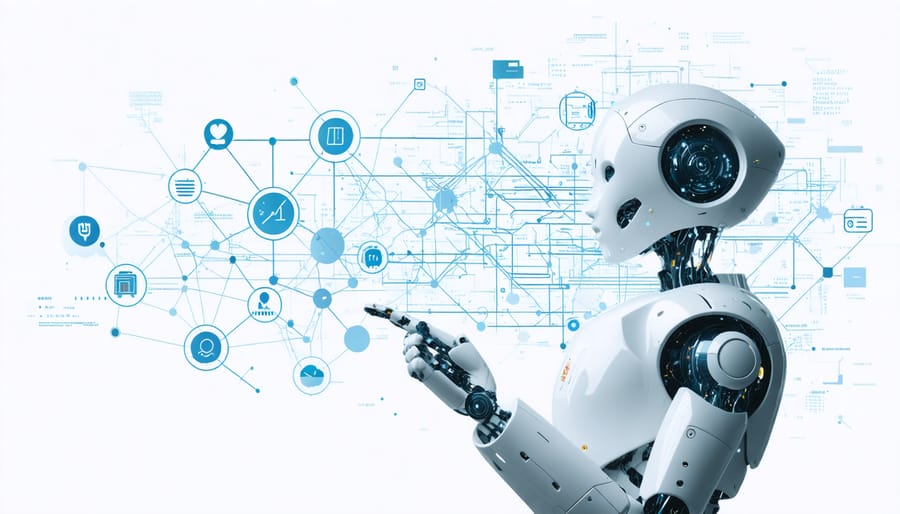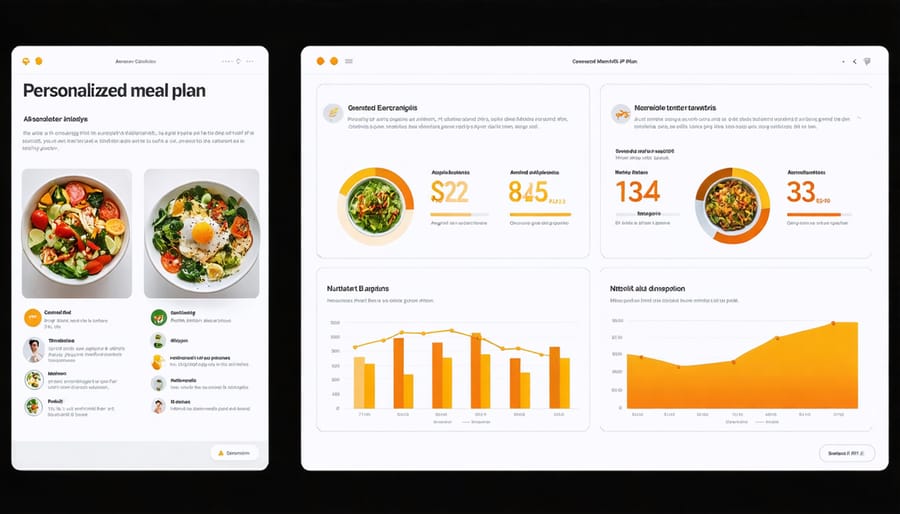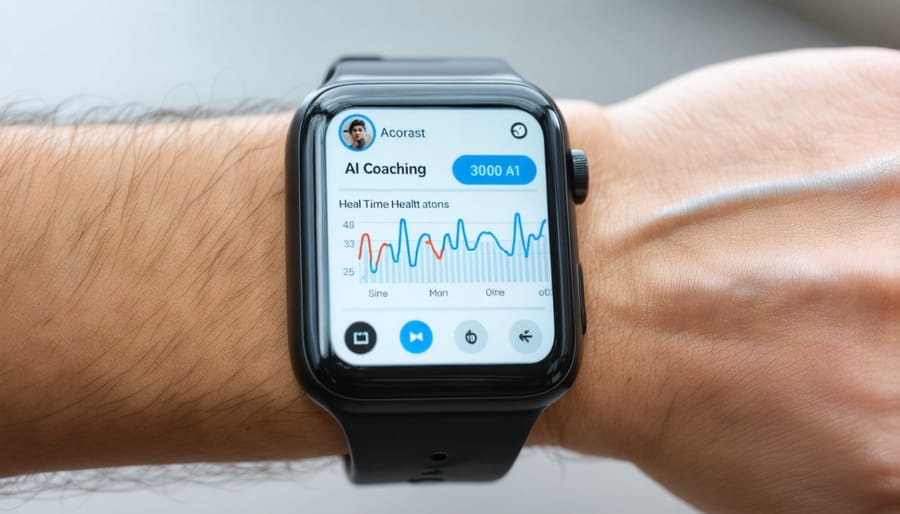Transform your wellness journey through AI-powered personalization that adapts to your unique biological rhythms, behavioral patterns, and health goals. Advanced machine learning algorithms now analyze thousands of data points – from sleep quality to genetic predispositions – creating truly individualized health protocols that evolve with you. This revolution in personal health optimization, including breakthrough developments in AI in mental health support, marks a dramatic shift from one-size-fits-all wellness programs to precision health solutions.
Gone are the days of generic health advice. Today’s AI-driven wellness platforms integrate real-time biometric data, environmental factors, and personal preferences to deliver actionable recommendations precisely when you need them. Whether fine-tuning your nutrition, optimizing your workout routine, or managing stress levels, these intelligent systems create a dynamic blueprint for your well-being that continuously refines itself based on your progress and changing needs.
The future of wellness is personal, predictive, and powered by AI – offering unprecedented insights into your health while maintaining the privacy and security of your sensitive data.
How AI Learns Your Unique Wellness Profile

Your Digital Health Fingerprint
In today’s digital age, your wellness journey creates a unique digital health fingerprint composed of thousands of data points. This comprehensive profile goes far beyond basic metrics like height and weight, encompassing everything from your genetic predisposition to specific health conditions to your daily step count and sleep patterns.
AI systems analyze multiple layers of personal information, starting with your genetic makeup, which reveals inherent health tendencies and potential risk factors. Your lifestyle data, including exercise routines, dietary preferences, and sleep cycles, provides real-time insights into your daily habits. Environmental factors, such as your location, local air quality, and seasonal patterns, add another dimension to your health profile.
Your digital fingerprint also includes behavioral patterns like food choices, workout preferences, and stress responses. Historical health records, including past illnesses, medications, and family health history, help AI systems understand your medical background. Even seemingly unrelated data points, such as your work schedule or social activities, contribute to a more complete understanding of your wellness needs.
This rich tapestry of information enables AI to create highly personalized wellness recommendations that evolve as you do, making your health journey truly unique and adaptive to your changing needs.
Real-Time Adaptation
Modern AI wellness systems operate like attentive personal coaches, continuously monitoring and adapting to your progress and feedback. These systems analyze multiple data points in real-time, from your daily activity levels to your sleep patterns and nutritional choices, creating a dynamic wellness plan that evolves with you.
When you log a challenging workout or report feeling unusually fatigued, the AI immediately adjusts future recommendations. For instance, if you consistently struggle with morning exercises, the system might suggest afternoon sessions instead. Similarly, if certain meal plans aren’t working for your schedule, the AI can propose alternative options that better fit your lifestyle.
The adaptation process uses sophisticated machine learning algorithms that identify patterns in your behavior and physiological responses. If you’re making steady progress toward your fitness goals, the system gradually increases the intensity of your workouts. Conversely, if you’re showing signs of stress or overtraining, it automatically dials back the intensity and suggests recovery activities.
This continuous feedback loop ensures that your wellness plan remains relevant and effective, making subtle adjustments daily while implementing more significant changes when necessary. The result is a truly personalized experience that grows more refined with each interaction.
Beyond Generic Nutrition Advice
Smart Meal Planning
AI-powered meal planning has revolutionized how we approach nutrition by creating highly personalized eating plans that adapt to individual needs. These smart systems analyze multiple data points, including dietary restrictions, food allergies, cultural preferences, and nutritional requirements, to generate meal plans that are both healthy and enjoyable.
The process begins with a comprehensive assessment of your personal profile. The AI considers factors like your height, weight, activity level, and health goals, along with any specific conditions such as diabetes or celiac disease. It then cross-references this information with extensive nutritional databases to create balanced meal combinations that meet your daily requirements for proteins, carbohydrates, vitamins, and minerals.
What makes these systems truly intelligent is their ability to learn from your feedback. As you interact with the meal suggestions, the AI notes your preferences and adjustments, gradually refining its recommendations. For instance, if you consistently skip suggested breakfast items containing eggs, the system will automatically adjust to provide alternative protein sources.
These platforms also consider practical aspects like grocery shopping and meal prep time. Many integrate with smart shopping lists and local grocery stores, making it easier to source ingredients. Some advanced systems even factor in seasonal availability of ingredients and your cooking skill level, ensuring the suggestions remain realistic and achievable.
The AI continuously optimizes your meal plan based on your progress toward health goals, making subtle adjustments to portions and ingredients while maintaining your taste preferences and dietary requirements.

Predictive Nutrition Analysis
AI-powered predictive nutrition analysis represents a significant leap forward in personalized wellness, using advanced algorithms to anticipate and prevent nutritional deficiencies before they develop. These systems analyze multiple data points, including dietary intake, genetic markers, blood test results, and lifestyle factors, to create a comprehensive nutritional profile for each individual.
The technology works by establishing baseline nutritional needs and then continuously monitoring daily food intake and nutrient absorption patterns. Machine learning algorithms process this information alongside historical health data to identify potential deficiency risks weeks or even months before traditional testing methods might detect them.
For example, if the system notices a declining trend in vitamin D levels based on food logging and reduced sun exposure during winter months, it can proactively suggest dietary adjustments or supplements. The AI also considers interactions between different nutrients, such as how iron absorption might be affected by calcium intake or how certain medications might impact nutrient absorption.
What makes this technology particularly powerful is its ability to adapt recommendations in real-time. As you log meals or update health metrics, the system refines its predictions and adjusts suggestions accordingly. This dynamic approach ensures that nutritional guidance remains relevant and effective as your body’s needs change over time.
The predictive capabilities extend beyond simple nutrient tracking to include factors like seasonal variations, travel plans, and exercise routines, creating a truly comprehensive approach to nutritional wellness.
Your AI Wellness Coach
Behavioral Pattern Recognition
Modern AI systems excel at identifying and analyzing behavioral health patterns through continuous monitoring of daily activities. These systems track various metrics like sleep cycles, exercise routines, eating habits, and stress indicators through wearable devices and smartphone apps. By processing this data, AI algorithms can detect subtle patterns that might escape human observation.
For instance, the technology might notice that you tend to skip workouts after late-night meetings or reach for unhealthy snacks during specific times of stress. This pattern recognition enables the creation of timely interventions, such as suggesting alternative meeting times or providing healthy meal prep reminders before known stress triggers occur.
The AI adapts its recommendations based on your response to these interventions, creating a feedback loop that continuously refines its understanding of your behaviors. This dynamic learning process helps break negative habits while reinforcing positive ones, making behavioral changes more sustainable. As the system learns more about your unique patterns, it becomes increasingly effective at predicting and preventing potential health-compromising behaviors before they occur.
Dynamic Goal Adjustment
AI-powered wellness platforms excel at adapting goals in real-time based on user performance and feedback. Unlike traditional static programs, these systems continuously analyze multiple data points, including activity levels, sleep patterns, and nutrition intake, to make intelligent adjustments to your wellness objectives.
When you consistently exceed or struggle with certain goals, the AI automatically recalibrates them to maintain an optimal challenge level. For instance, if you’re regularly surpassing your daily step target, the system might gradually increase it while simultaneously adjusting related goals, such as calorie intake or recovery time.
The true power of dynamic goal adjustment lies in its ability to account for life changes. During busy periods, illness, or travel, the AI recognizes patterns of reduced activity or altered sleep schedules and temporarily modifies your targets accordingly. This prevents discouragement and maintains momentum toward long-term wellness objectives.
The system also considers seasonal variations, environmental factors, and your body’s natural rhythms when adjusting goals, ensuring that your wellness journey remains both challenging and achievable throughout the year.
Motivation Through Technology
Modern wellness platforms leverage artificial intelligence to keep users engaged and motivated throughout their health journey. These smart systems analyze patterns in user behavior, progress, and preferences to deliver perfectly timed nudges and personalized encouragement. For instance, when the AI detects a user consistently meeting their fitness goals, it might gradually increase the challenge level to maintain engagement and prevent plateau.
The technology employs various motivational techniques, from gamification elements like achievement badges and progress visualizations to AI-powered mental wellness coaching that provides emotional support and guidance. These systems can identify when users are most likely to disengage and proactively intervene with tailored content, challenges, or supportive messages.
What makes AI-driven motivation particularly effective is its ability to adapt in real-time. Unlike traditional one-size-fits-all approaches, these systems learn from user responses and adjust their motivational strategies accordingly. Whether it’s sending workout reminders at optimal times or celebrating small victories in ways that resonate with individual preferences, AI ensures that each user receives the right type of encouragement at the right moment to maintain their wellness journey.

Privacy and Ethics in AI Wellness
Data Security Measures
In the realm of personalized wellness, data security stands as a critical cornerstone. Modern AI wellness platforms employ multiple layers of protection to safeguard sensitive health information. Most systems utilize end-to-end encryption, ensuring that personal data remains scrambled and unreadable during transmission between devices and servers.
Leading wellness platforms implement strict access controls through multi-factor authentication and role-based permissions. This means that only authorized healthcare providers and AI systems can access specific portions of user data necessary for their functions. Personal health information is typically stored in segregated databases, with identifying details kept separate from health metrics to maintain anonymity even in case of a breach.
Many providers adhere to international data protection standards like GDPR and HIPAA, regularly conducting security audits and vulnerability assessments. AI wellness applications often incorporate privacy-by-design principles, collecting only essential data and automatically purging unnecessary information after a set period.
Users maintain control over their data through granular privacy settings, allowing them to choose what information to share and with whom. Some platforms have adopted blockchain technology to create immutable records of data access and changes, providing transparency while maintaining security.
Regular system updates and security patches ensure that protection measures evolve alongside new threats, while automated monitoring systems detect and respond to suspicious activities in real-time.
Ethical AI Decision-Making
In the rapidly evolving landscape of personalized wellness, ethical considerations must guide AI decision-making processes. Companies developing AI wellness solutions are increasingly adopting ethical AI healthcare practices to ensure their recommendations prioritize user well-being above all else.
Key principles include transparency in how AI makes decisions, fairness in recommendation distribution across diverse user groups, and the implementation of safety checks to prevent potentially harmful suggestions. For instance, when an AI system detects unusual patterns in user behavior or concerning health metrics, it should be programmed to recommend professional medical consultation rather than providing automated solutions.
Data bias remains a critical concern, as AI systems must be trained on diverse datasets to ensure recommendations work effectively for people of all backgrounds, ages, and health conditions. Developers are implementing rigorous testing protocols to identify and eliminate potential biases before deployment.
Regular audits of AI decision-making processes help maintain high ethical standards. These reviews examine not just the accuracy of recommendations but also their potential impact on users’ physical and mental well-being. Companies are also establishing clear boundaries for AI interventions, recognizing when human expertise should take precedence over automated suggestions.
User autonomy is preserved through clear opt-out options and detailed explanations of how the AI system arrives at its recommendations, empowering individuals to make informed choices about their wellness journey.
As we look to the future of wellness technology, AI-driven personalization stands as a transformative force in how we approach health and well-being. The integration of artificial intelligence with personal health data has already demonstrated remarkable success in creating truly individualized wellness programs that adapt and evolve with each user’s progress and needs.
The benefits of this technological advancement extend far beyond simple workout recommendations or diet plans. By analyzing complex patterns in sleep, nutrition, activity levels, and even genetic predispositions, AI systems can now provide unprecedented levels of customization that were impossible just a few years ago. This comprehensive approach has shown measurable improvements in user engagement and long-term health outcomes.
Looking ahead, the potential for AI in personalized wellness appears boundless. Emerging technologies in wearable devices, coupled with advances in machine learning algorithms, promise even more sophisticated health insights and recommendations. We can anticipate systems that not only react to our current health status but predict and prevent potential health issues before they arise.
However, the true power of AI-driven wellness lies in its ability to democratize personalized health care. As these systems become more accessible and affordable, more people can benefit from custom-tailored wellness programs that previously required expensive personal trainers or health coaches. This democratization, combined with continuous technological advancement, points to a future where optimal health becomes more achievable for everyone.

